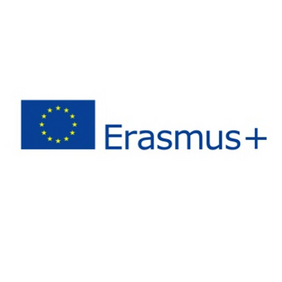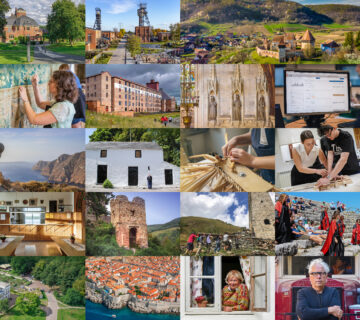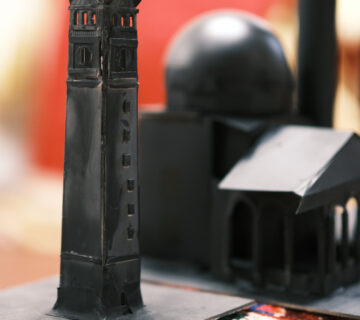
Becomming a Zoom pro (Image: Mohedano)
Firstly, we should recognise the effort over the preceding year of Bettina Lehnes, the previous IE Conference Manager, and the team from SALM – the Foundation of Haapsalu and Läänemaa Museums, who together had put in a lot of work to enable us to all meet in person in Estonia in May and had very little notice that the conference would need to be cancelled. With a pandemic sweeping the world and heavy hearts for everyone’s suffering and the future of our profession, the decision was taken to attempt something positive and move the conference online rather than cancel altogether. For the effort it took to make this dream a reality, we should thank Nuria Mohedano, who took on the role of conference manager, and her team, especially Adi Kasumović, who built a bespoke web platform in just four weeks and managed all the tech complications throughout the four days to deliver a largely flawless experience.
So, what was it like for 160+ interpretation professionals to come together from their homes all around the world for four days packed with presentations, workshops, debates, chats, mini virtual field trips, shared meals, singing and laughter? You can download the conference proceedings to read the full papers of some of the excellent presentations, but we wanted to give a bit more of a flavour of the event so here’s what some of you thought. First from Nuria herself, who was a little tired at the end of it all and still busy into the night long after everyone switched off their computers for the last time…
Nuria Mohedano (Spain)
I am always on the lookout for great adventures in life, so I could not resist joining the iecon20 crew. Being part of a determined and inspiring team, and fulfilling my willingness to keep on learning about heritage interpretation and new technologies, were my main motivations. Full attention was required not only before, but also during and after the event. The biggest challenge, without a doubt, was letting my creativity flow freely and losing the fear of leaving nothing ahead but creating an exciting, participative and meaningful online event. It felt like jumping for the first time into a swimming pool – I was expectant and nervous the night before, and it was blissful whilst in, but then came disappointment because it was all over too soon. I do feel super lucky being part of such a community though.
Simana Markovska (Bulgaria)
A revolution in the making! There is a well-known saying: When life gives you lemons, you should make lemonade. This was clearly demonstrated by the IE Conference 2020, which was first cancelled because of the current world crisis but then re-designed for web space. This was a real risk as it had never been done before with over 150 people from all over the globe. It all ran surprisingly smoothly despite the issues of “Oh, my microphone is not working” and “Why can’t I turn my camera on?” That was, of course, extensively due to the tech-team who were amazing but I am sure the overall willingness of all participants to actually hear and see the others did also play a part. Nothing was lost from the delivery of information, visuals and experiences, and the opportunity to actually discuss the topics in real-time while presentations were still running was an unexpected bonus. For me personally, the efforts of the organising team to provide social communication and exchange despite the situation deserves the greatest admiration. I loved it all – the evening events, the music, the option of inviting someone to your coffee table during breaks, and very much the special social platform designed only for participants on the conference website. As a first revolutionary attempt to handle such a massive event online, it exceeded my expectations manifold. I can’t wait to see what might become of it with more experience and time!
Janja Sivec (Slovenia)
When I first found out that we were moving online, I was sceptical. I have been to quite a few IE conferences so far and the personal contact and the excursions were the best parts. But being in front of the screen has surpassed my expectations on all the ways we can interact, and I am amazed by all the wonderful special features that conference attendees sent in. I miss seeing all of my IE friends in person, but I am so proud and amazed by the energy and community spirit I felt during this conference.
Ivana Jagić Boljat (Croatia)
When I heard that this year’s conference would take place online, I was really thankful for this opportunity because for me the option to attend the offline one wasn’t possible this year. It was exciting, different and new even to discover what interesting facilities were going to be offered: games like the scavenger hunt, thematic food evenings, round table discussions, speakers’ corner… It all sounded so engaging and motivating. And then it happened. Those four days ran so fast like we had the time of our lives! And I really mean it. Maybe it was exactly because of the lockdown that aroused the feeling of loneliness, and then all of a sudden you could see more than 160 familiar smiling faces drinking their tea or coffee from their favourite mug, while sharing with us a piece of their home. It was definitely a new perspective of meeting IE family members. During those four days I heard many inspiring presentations and in some of our many chat discussions, there were a lot of thoughts provoked, especially ones reflecting this time when we are rethinking life with our communities and putting heritage interpretation even more in focus.
Peter Seccombe (UK)
I think many of us may have had few expectations for this conference. Replacing a ‘real live’ conference with something online might seem a less significant event, but then 160 people registered which is more than we normally get at the ‘live’ conference! And what did we get? We had presentations, just like we get at a normal conference, but this time we could comment and chat as the presentation progressed. We could ask questions, and the presenter could answer the questions and make further comments during and afterwards. We had discussions in groups and it was easy to contribute and to ask questions, and also to have more ‘chats’. It seemed like all participants felt comfortable with the format and they were certainly happy to contribute and to join in with the discussions. We also got some really personal, and very evocative, videos of spring walks, fantastic recipes and special places. And what didn’t we get? Of course, we didn’t get the personal, face-to-face contact with ‘real people’, which often is what conferences are really about. We didn’t get the conversations in the bar and during meals and we didn’t get the site visits to see places and how they are interpreted. But somehow that didn’t seem to matter as the videos seemed to make up for this loss.So, it could have been a ‘lesser’ event, but I think in many ways it was a ‘greater’ event, for the excellent presentations, the opportunities to interact with presenters and each other, and for the snapshots of the participants’ special places and homes through their videos and their live presence from their houses. I don’t think an online conference replaces a live conference, but it can be a really valuable alternative for sharing information and developing a different kind of meaning about people, places and experiences.
Dimitra Sidiropoulou (Greece)
The conference was really a first-hand experience of how important a community is. So much diversity and though so much in common. Emotion, reason, even senses (I still have the sound of the voice of some people in my ears) were there. It would be nice if each conference had a complementary digital part as such.
Angus Forbes (Germany)
What a unique parallel experience this conference was … to be in two places at once (your own home and online with colleagues) for four days…with input from both simultaneously! Thank you for going for it and for all your work and ideas to make it happen. With the unflattering lighting, technical unfamiliarity and internet glitches it could only work with bucketloads of good will… which clearly exist within IE! It was also great that we could return to the virtual venue after the conference to watch the things I missed first time around.
Sarah De Nardi (Australia)
Thanks so much to everyone for an inspiring event with lots of amazing papers, discussions and for such a fun, inclusive, supportive and friendly atmosphere. Sorry I missed the closing remarks because of timezones.
Friederike Malisch-Johnigk (Germany)
I just wanted to say what an impressive job it was to turn this into an online conference in such a short amount of time. Thank you so much for everything! I truly enjoyed the talks and I was amazed by all the different ideas to add some social flair to the online frame. However, I would also love to meet all of you in person next time and to sit down and chat over a real cup of coffee!
Zsuzsa Tolnay (Hungary)
It was a pleasure to be together like this. I would like to congratulate both organising teams. I felt really sorry when I learnt that the conference was to be cancelled, and I am sure that the Estonian team had put a great amount of work into it. I was really looking forward to visiting Estonia again – and of course meeting the IE community. Then life happened… but I am thankful that, after grieving the loss, others started to think about other ways to continue. And now we have just finished a four-day web conference! Lot of challenges (mostly technical), many more inspirations, and we did get to meet the IE community. Thank you all.
Athina Tsekoura (Greece)
As I closed all the windows at the end of the last day, I noticed a picture of a lighthouse was sending light from my desktop! I found it very symbolic, as the lighthouses show us the route we have to follow. I wish you all to spot your lighthouse for a safe route that will bring us all together again one day.
Mini field trips
Throughout the conference, we were taken around the world on virtual tours given by some participants to share their neighbourhood or local special heritage feature. We had some excellent culinary tips from Igor Ianachi in his kitchen and garden in Croatia and Abby McSherry from Ireland showed us how to make traditional soda bread, we visited local neighbourhoods in Albania, Bulgaria, Croatia, Czech Republic, Estonia, France, Israel, Italy, Portugal, Slovenia, Sweden and the UK, we saw some old objects from Annette Lyttle’s grandparents in the USA, were taken to Romania and Poland via inspiring podcasts, and discovered some musical delights – both in terms of other members’ local or national treasures and also the original offerings from some of our own members. These little tasters of each other’s lives and heritage helped us to make real connections with each other across the virtual divide. These two examples have been made available on YouTube so if you missed them or want to watch again, you can enjoy a little taster of some of the extra conference content here:
Janja Sivec’s walk around her local area in Slovenia with a ‘spring plate’ of greens to enjoy: https://youtu.be/1BFLTyk4bH0
Marie Banks’s virtual tour of her micro museum in the UK: https://www.youtube.com/watch?v=RP8f3UN3qFw
Scavenger hunt stories
One of the evening activities organised by Athina Tsekoura, our social director for the conference, brought us together in fun and laughter whilst also reminding us of the power of interpretation. Participants were tasked with ‘scavenging’ different items of treasure from around their homes according to different categories: something used daily in the kitchen; something from your desk; the last item to enter your home, etc. After each category and as soon as the last person had returned to their screen, we took it in turns to show our treasure to the group and explain the meaning to us. Poor Anders was joining us online from a different building to where all his personal items were and had to keep running up the hill in the dark to find his treasures and bring them back to us. At the end of the evening getting to know each other a little better – as you do at all good conferences after the daytime programme ends! – Athina tasked us to write a short story about our particular objects. Here are some of the stories and the objects that inspired them.
Anders Arnell (Sweden)
I have been a bird-watcher since I was ten, and for my 20th birthday, my aunt gave me some beautiful (and now rare) coffee cups with Swedish birds, like the Pied Flycatcher, Blue Tit and Robin. Then the urge for travelling became stronger, and for the coming 15 years I spent time both sleeping on the beach in Barcelona, drinking New Zealand ginger beer and visiting the gorgeous Polish Tatra mountains from where I still keep a few small crystal glasses bought in Zakopane. This wanderlust I probably inherited from my parents, who did their share of hitch-hiking and youth camps in Europe in the ‘50s, and then took me and my sister to various places in Sweden and Europe in the ‘60s and ‘70s. One memorable journey was through the then for us quite secluded countries Czechoslovakia and East Germany, and I still keep my small souvenir pennant from Berlin DDR. But of course, in the long run and facing the situation we are in right now, it’s always best to stick to your home and make use of your favourite egg slicer – one of the first household items I bought after moving from my parents. See, there’s the connection to birds again!
Vida Ungar (Croatia)
My treasure basket
I took a basket for collecting my evening scavenger hunt treasure, and as I arranged it to take a photo, I thought that it could as well be a picnic basket. If I were to find it on the beach, what would it tell me about the owner? He must be an old natural historian, inseparable from his Warbug Pflanzenwelt, the Belle-Epoque botanists’ Bible. He collected a Clypeaster fossil somewhere along the way, probably in a nearby cave – an item much older than him and his botanic book combined. After his long stroll along the beach, he sat down to rest. He had some olives from his special Portuguese Azeitonas/Caroços bowl with separate parts for olives and olive-stones. He washed the olives down with a bottle of beer, that he just bought in a nearby store. Then he played his little ocarina, a precious gift from a dear friend, who sent it to him all the way from Bolivia… And the little glass bird? It’s his family treasure, passed on from generation to generation. His great-great grandfather, the glass-maker, made it as a Christmas tree decoration. I wonder what it is doing in our hero’s picnic basket… Well, maybe he just decided to take it for a walk…
Janja Sivec (Slovenia)
Since I am not cooking any IE trainings at the moment, this means that my trusty heritage piece that helps me do the exercise meanings in a nutshell is staying at home, just like me. But not all is bad, I see the situation as a possibility to dream where I will go with the voucher ticket I will get. I have to apply for a refund! Greece would do nicely, definitely on my bucket list. And this is also the time to give attention to your loved ones, even if you have to read the book over and over again.
Marie Banks (UK)
You’re so far from home, surrounded by unfamiliar sights, sounds and smells.
So many new experiences filling your cup that you forget who you are.
Don’t despair.
Light a candle, look into the flame, remember the stories your grandmother told you. The same flame will burn around the world wherever you are and re-light those memories.
Your identity still beats inside.
Catarina Magalhães (Portugal)
While preparing his favourite coffee, great-grandfather Américo was reading the great Portuguese playwrite, Gil Vicente, trying to memorise a couple of beautiful lines to seduce a nice girl on that magnificient reveillon he was about to attend with his mate, Augusto. Right on time, Augusto rang the doorbell as a sign for them to leave. Once at the party, they realised it had a rather futuristic theme and, to make it worse, there was no live band, just a melodramatic tape by Jorge Ferreira! Augusto, who had a more flamboyant temper, stole the tape and broke it with a rock! But his move wasn’t quite gracious as he hit his own foot! Having shouted “ARGH For Saint Catherine, MY FOOT!” an icon of the saint fell from the skies onto his foot.
What happened next? Only their photographs can tell you…
If you wish, check out Jorge Ferreira – Os olhos de minha mãe (My mother’s eyes): https://youtu.be/rip9JGRwDS0
Carla Silva (Portugal)
She was cooking when something happened. The walls started to shake and things in the kitchen started to wobble. She shouted: “It’s an earthquake! I must save something before the whole house falls down!” And so, in under one minute, still with the wooden spoon in one hand, she managed to grab the one-metre measuring stick that was hanging over her head on the wall (before it fell down), her grandmother’s pearls, the Polish souvenir bracelet she had worn the day before, her favourite book (she co-authored with her best/boyfriend)… not forgetting of course her new jeans, still yet in the bag, the only ones that will fit after this winter season of staying at home!
Lessons learnt brochure
IE compiled findings from its web conference in a brochure to support organisations that also need to turn their conferences into online events.
This 28-page brochure includes experiences on how IE increased the attractiveness of the event, met technological challenges, built the team and managed the budget, and how it communicated the conference.
Since this was the first time that IE had run such a complex event online, the brochure cannot claim to be a comprehensive recommendation on how to organise online conferences. However, it offers a quick résumé to share some of the lessons IE learnt during the preparation and running of its web conference 2020.
You can find the brochure at www.interpret-europe.net/material. Please feel free to share it with all who might benefit from it.
To cite this article:
Various contributors (2020) ‘Zooming from room to room – Fostering heritage communities online’. In Interpret Europe Newsletter 2-2020,5-9.
Available online: https://www.interpret-europe.net/fileadmin/Documents/publications/Newsletters/Newsletter_summer_2020.pdf




